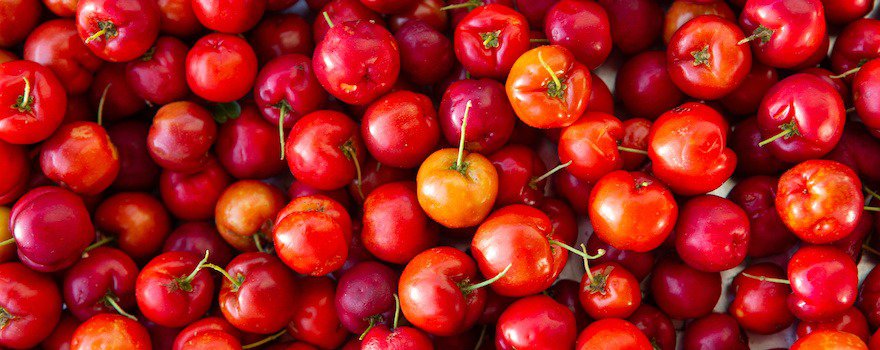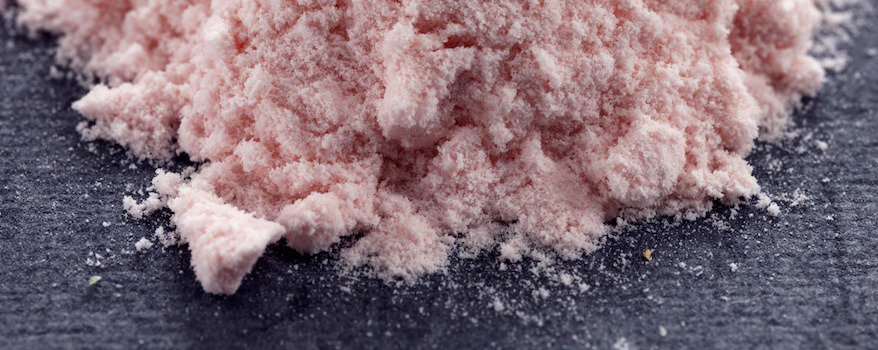BENEFITS OF ACEROLA
✓ Very rich in vitamin C
✓ Antioxidant
✓ Anti-bacterial
✓ Protects the heart and helps burn fat
✓ May have anti-cancer properties
What is acerola?
Acerola (Malpighia emarginata) is a tropical fruit native to Central America, South America and the Caribbean. It has the appearance of a cherry, hence its various nicknames: Barbados cherry or West Indian cherry.
In the Brazilian and Peruvian Amazon, the acerola tree can reach up to 5 m. Its fruits have been consumed there for several millennia, and harvesting is still artisanal. In our latitudes, it is also possible to grow it in a pot at home! Why does it attract so much interest?
Acerola is known for its very high vitamin C content. It is one of the fruits richest in vitamin C. It contains 20 to 30 times more than an orange.
In addition to being a natural source of vitamin C, acerola has a very interesting nutritional profile. It is rich in minerals and trace elements and contains a significant amount of antioxidants.
Outside the regions where it grows, it is mainly consumed as a dietary supplement, in tablet or powder form, although it is common to find it as a juice in online organic and health food stores.
Some manufacturers also offer acerola chewing gums, be careful, these are very low in fruit and high in sugar.
Nutritional composition
- Vitamins: A, B1, B2, B3, B5, B6, B9, C
- Minerals and trace elements: calcium, iron, magnesium, manganese, phosphorus, potassium, sodium, zinc
- Proteins
- Antioxidants: flavonoids, anthocyanins, carotenoids

Benefits of acerola
★ Very high in vitamin C: helps fight fatigue and boosts the immune system
Acerola is the fruit with the highest vitamin C content after the camu camu. It contains about 1.8 g of vitamin C per 100 g of acerola pulp.
Vitamin C plays an essential role in our bodies. It stimulates the immune system and helps fight infections, particularly in winter. Consuming acerola is therefore recommended to prevent colds and the flu.
The cherry also has anti-fatigue properties, and the vitamin C it contains helps bind iron in our bodies, and contributes to increasing our energy.
It also supports the production of collagen, the protein that forms tissues such as our skin, our bone tissues, and our ligaments…
Finally, the vitamin C contained in acerola is particularly bioavailable, meaning it is well absorbed by the body.
This study conducted by several Brazilian universities showed that among a selection of fruits known to contain vitamin C, including oranges and strawberries, acerola had the highest level, particularly when it was organic.
This R&D study by Nichirei Foods Inc in Japan demonstrated that certain components of acerola enhanced the bioavailability of vitamin C.
★ Antioxidant
Acerola is also a powerful antioxidant. On one hand, its antioxidant activity is due to its richness in vitamin C. Indeed, this vitamin promotes the elimination of free radicals, which degrade and accelerate the aging of our skin and tissues.
Furthermore, it contains other antioxidants, including flavonoids, anthocyanins, and carotenoids.
This study conducted by several Brazilian universities shows its high antioxidant content compared to other tropical fruits.
★ Anti-bacterial
Acerola is used in the Amazon for its antibacterial and antifungal properties, and for fever or infection.
Some of its bioactive compounds help fight microbes and act as protective agents.
This study by various Italian and Spanish universities demonstrated that some of its compounds helped reduce microbial activity on raw meat and delay its spoilage.
★ Protects the heart and helps burn fat
Acerola reduces the risk of cardiovascular disease by protecting our body against bad cholesterol (LDL) and the buildup of lipids.
Vitamin C and the antioxidants it contains help regulate our blood sugar and help burn fat during exercise.
This study from the University of Southern California in Los Angeles, conducted in vitro, showed that acerola combined with soy and alfalfa extracts blocked bad cholesterol (LDL).
★ May have anti-cancer properties
Acerola may have anti-cancer properties. These are under study and early results are promising, particularly in animals.
This study from Nihon University in Fujisawa, Japan, demonstrated that acerola extract prevents the proliferation of tumor cells in the lungs of mice.
This one, conducted by Meiji Pharmaceutical University in Tokyo, demonstrated the cytotoxic action of acerola extracts on human cancer cells, and thus its potential use in cancer treatment.

How to consume acerola?
Prefer organic acerola
To avoid traces of pesticides and other harmful residues, favor organic sources when possible, preferably from plantations that adhere to fair trade standards.
Acerola tablets

Acerola is often sold commercially in tablet form, but you need to choose them carefully! Marketed as natural vitamin C, these tablets sometimes contain only a minimal amount of acerola and many additives, so you should pay close attention to their composition.
A 1000mg tablet should contain about 170mg of vitamin C from acerola, which represents 213% of the RDI for vitamin C. If a higher amount is listed, it is probably a false claim.
Tablets can be chewable, effervescent, or swallowed.
Acerola powder
Besides tablets, acerola is also available commercially in powder form. The powder is obtained from the pulp of the freshly pressed fruit. It is then dehydrated and ground into powder.
Inspect the labels! If it is cold-pressed, it is then considered raw, which preserves its vitamin C content.
Acerola powder can be easily mixed into smoothies, juices, and yogurts. If it’s pure, its taste is tangy; otherwise, watch out for frequent additions of sugars and flavorings!

Dosage
In tablet form: a 1000mg tablet per day is recommended as part of a three-month course.
In case of a cold: up to 2000g/day for three days.
In powder form: 1 to 2 teaspoons per day as part of a three-month course.
Contraindications and side effects
There are no contraindications or major side effects at the indicated doses. The high vitamin C content of acerola can cause side effects in case of overdose, notably digestive problems, diarrhea, and nausea.
Excessive use can also cause the formation of kidney stones, so it is also not recommended for people with a history of such conditions.



